Disease
Disease refers to any condition that impairs the normal functioning of an organism. It can be caused by various factors including pathogens such as bacteria, viruses, fungi, and parasites, as well as non-infectious factors such as genetics, environmental pollution, and lifestyle choices.
Types of Diseases
There are different types of diseases:
- Infectious diseases: These are caused by pathogens and can be spread from person to person, or from animals to people. Examples include the flu, tuberculosis, and HIV/AIDS.
- Non-infectious diseases: These are not caused by pathogens and are typically related to genetics, lifestyle, and environmental factors. Examples include diabetes, heart disease, and cancer.
Causes of Diseases
Diseases can be caused by various factors:
- Pathogens: Microorganisms such as bacteria, viruses, fungi, and parasites.
- Genetics: Inherited genetic mutations can predispose individuals to certain diseases.
- Environmental factors: Exposure to pollutants, toxins, and radiation can contribute to the development of diseases.
- Lifestyle choices: Factors such as diet, exercise, smoking, and alcohol consumption can influence the risk of developing certain diseases.
Preventing and Treating Diseases
Preventative measures and treatments for diseases include:
- Vaccination: Immunization helps prevent the spread of infectious diseases.
- Hygiene practices: Regular handwashing and sanitation can reduce the risk of infections.
- Healthy lifestyle: Eating a balanced diet, exercising regularly, and avoiding harmful substances can lower the risk of non-infectious diseases.
- Medication: Pharmaceutical drugs and therapies are used to treat various diseases.
- Surgery: In some cases, surgical procedures may be necessary to treat or manage certain diseases.
Study Guide
To study the topic of disease, consider the following key points:
- Define disease and explain its impact on organisms.
- Identify and describe the different types of diseases, including examples of each type.
- Explain the causes of diseases, including pathogens, genetics, environmental factors, and lifestyle choices.
- Discuss preventative measures for infectious and non-infectious diseases, such as vaccination, hygiene practices, and healthy lifestyle choices.
- Explore the various treatment options for diseases, including medication, surgery, and other therapies.
◂Science Worksheets and Study Guides Fifth Grade. Energy and ecosystems
Study Guide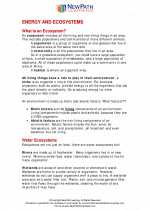 Energy and ecosystems
Energy and ecosystems  Worksheet/Answer key
Worksheet/Answer key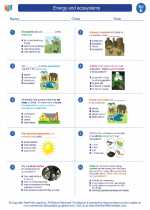 Energy and ecosystems
Energy and ecosystems  Worksheet/Answer key
Worksheet/Answer key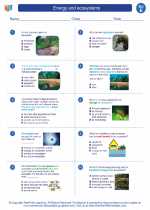 Energy and ecosystems
Energy and ecosystems  Worksheet/Answer key
Worksheet/Answer key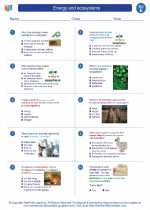 Energy and ecosystems
Energy and ecosystems  Vocabulary/Answer key
Vocabulary/Answer key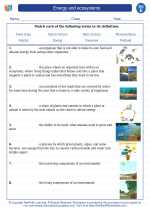 Energy and ecosystems
Energy and ecosystems  Vocabulary/Answer key
Vocabulary/Answer key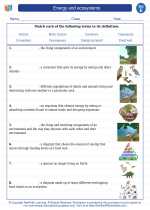 Energy and ecosystems
Energy and ecosystems  Vocabulary/Answer key
Vocabulary/Answer key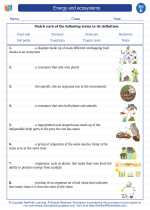 Energy and ecosystems
Energy and ecosystems 

 Worksheet/Answer key
Worksheet/Answer key
 Worksheet/Answer key
Worksheet/Answer key
 Worksheet/Answer key
Worksheet/Answer key
 Vocabulary/Answer key
Vocabulary/Answer key
 Vocabulary/Answer key
Vocabulary/Answer key
 Vocabulary/Answer key
Vocabulary/Answer key

The resources above cover the following skills:
PHYSICAL SCIENCE (NGSS)
Energy
Students who demonstrate understanding can:
Use models to describe that energy in animals’ food (used for body repair, growth, motion, and to maintain body warmth) was once energy from the sun.